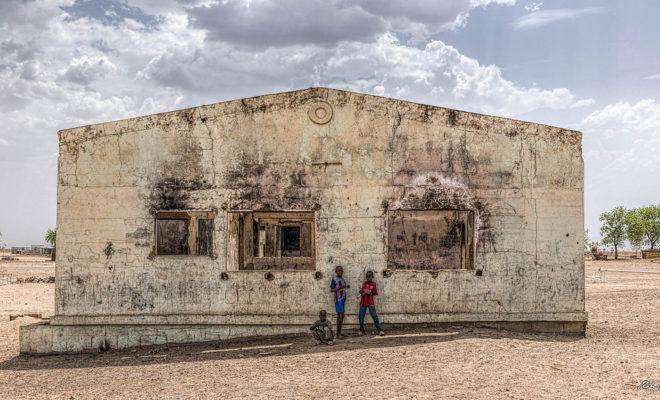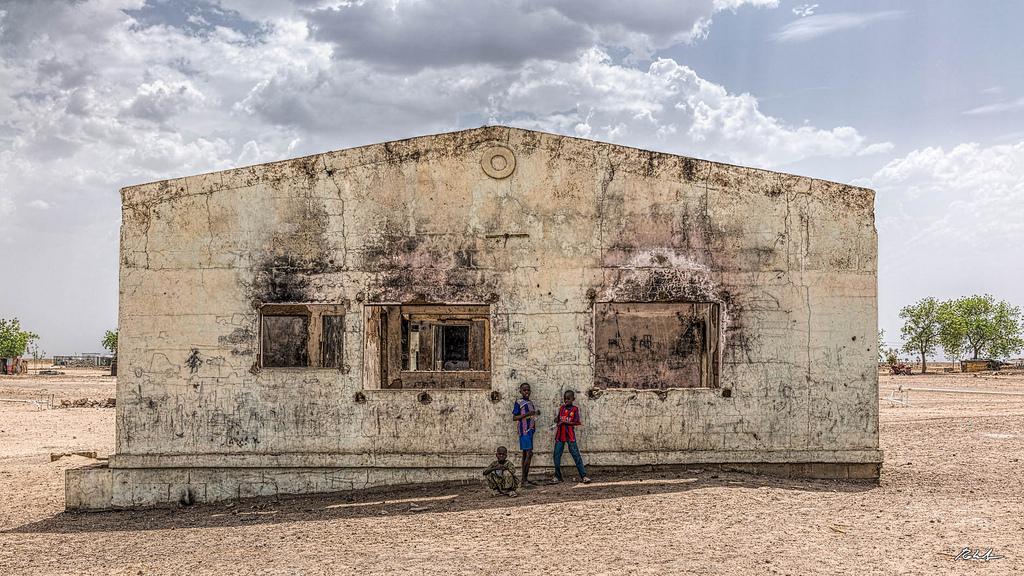Visiting Boko Haram territory

An excerpt from Helon Habila’s new book, The Chibok Girls.

Schoolboys with a school in Borno state, northeastern Nigeria. Credit: Roberto Saltori.
Three days before my trip to Chibok, I had flown into Maiduguri, the capital of Borno state, from Nigeria‘s capital Abuja. The flight had been delayed for over an hour due to bad weather. The Harmattan hung over Abuja and most of northern Nigeria in a white, soupy pall, cutting visibility to near zero. The weather is fickle and changes fast around this time of the year. By May, Maiduguri would get so intolerably hot that if you took a shower, before you left the bathroom the water on your body would have turned into sweat. Despite the swirling dust and the dehydrating wind, this was, weather-wise, the best time to come to Maiduguri. Because electricity and air-conditioning cannot always be guaranteed, better the Harmattan than the hellish heat. It gets so hot here, the joke goes, that you don’t need to boil water to make tea − it comes out of the tap already boiling.
The invisible landscape below our plane was mostly Sahel savannah, the vegetation getting progressively thinner and drier as one leaves Abuja and enters Borno State in the northeast. Borno State is vast, covering 27,372 square miles, making it the second largest state in the country. It has the most international borders of any state, adjacent to Niger, Chad, and Cameroon.
In the heart of the state and running toward the southeast is the Sambisa Forest, which stretches from Borno State to neighbouring Yobe, Gombe, Bauchi, and Kano. It is populated by thick-barked and thorny trees and bushes, which makes it hard to penetrate. A few hundred miles northwards the vegetation peters out into the Sahara. Southeastwards it meets the Mandara Mountains and the Gashaka Gumti National Park, which forms a corridor into the central African forest.
This is Boko Haram territory. If the group, which sprouted up in this region, were to randomly pick any terrain in the whole country for the best cover and the best bolt-holes, it couldn’t have hit on a better place.
Abbas, my 27-year-old guide whose services I had enlisted a month earlier, and I took a taxi into town from the airport. A reporter friend had told me what happened when he mentioned Boko Haram to a cab driver. He had arrived from Lagos and at the airport he had grabbed the first taxi he could find. Pressed for time and always conscious of his looming deadline, he had blurted out to the driver, “Can you take me to where I can meet Boko Haram members?” The car came to a screeching halt and the driver turned to him. “Don’t ask me about Boko Haram. I don’t know them. My agreement with you is to take you to your hotel, no more.”
So I employed a less direct approach. “The last time I was in Maiduguri was over twenty years ago,” I told the driver. “So much has changed.”
Our driver, however, turned out to be rather garrulous, his Kanuri accented Hausa rising and falling with the cadence of his speech.
“Our problem is modernity,” he said. “We accept modernity too quickly. Now a woman will go out with a foreigner, a white man. Before, our women would be too scared to go near a white man. Now, we spill our secrets to the white man, everything we know we go and tell him for reward, all in the name of Western education.”
I was surprised by how close his words were to the general Boko Haram ideology. The words boko haram, after all, can be roughly translated as “Western education is abhorrent”. I wasn’t sure if our driver was repeating what he had heard others say, but Mohammed Yusuf, the founder of Boko Haram who died in police custody in 2009, used to preach openly at mosques and in squares, traveling widely from his base in Maiduguri to neighbouring states like Bauchi, Gombe, Yobe and Kano. Cassette tapes of his sermons were − and perhaps still are − widely available on the streets and at mosques. Videos of his lectures and debates are available on YouTube.
My hotel, the Satus, was a rather popular destination, especially for foreign NGO workers, and it was easy to see why. Located off a busy, gridlocked street (locals told me there had been construction work on this five-mile stretch of road for over five years), it was only a few minutes from all the central parts of Maiduguri. The hotel was hidden behind huge walls, like most buildings in the area. Neighbours usually merged their compounds together, creating large private neighbourhoods inside tall dividers.
The hotel swimming pool was deserted. It was hard to imagine anyone packing swimming trunks and bikinis as they prepared to come to Maiduguri. Sharia law had not been kind to the hospitality industry; hotels and restaurants were viewed with suspicion and distrust. The receptionist, a young man named Daniel from the southern part of the country, told me the hotel generators were turned on at 5pm daily. The National Electric Power Authority was legendary for its unreliability. The rooms were reasonably clean, and the service was tolerably efficient. I was lucky to get a room without prior reservation, he told me. They usually had a long waiting list of mostly NGO workers.
I met a few of them in the restaurant. Some had the look of long-term residents; they all had a wary, cautious air about them. Maiduguri was a town disoriented by the insurgency, and though it was slowly returning to normal, you could tell from their body language the people had almost forgotten what normalcy was like, and it would take a while for them to regain their balance. This had been, and still was, a veritable war zone. Bombs had exploded in hotels and in mosques and churches, preachers had been slaughtered in front of their congregations and in their homes, sons had killed their fathers and informed on their teachers, and neighbours had turned against neighbours. Every night, curfew began at 9pm. It used to be as early as 6pm during the state of emergency in 2013. Almost every single person in the state had personal stories of close encounters with death at the hands of the military or Boko Haram. Even a child could point to a spot on the street where he or she had seen a dead body.
And that’s exactly what Abbas, who had lived in Maiduguri all his life, did as he drove me around to point out important landmarks in the Boko Haram war. There, he said, pointing at one house front, was where a famous preacher, Mallam Ismail, was gunned down. The preacher had spoken out strongly against Boko Haram in his sermons. One day, two young boys with Kalashnikovs followed his car, stopped him just off the main road, and told him they had come “to do God’s work” before shooting him. Later Abbas pointed at some neem trees within which Boko Haram fighters hid overnight and came down in the morning and attacked the barracks. We passed the University of Maiduguri where Abbas had graduated. Like most Nigerian graduates, he had not secured employment and was planning to go back for a Master’s degree. The University Teaching Hospital was where, during the 2009 Boko Haram uprising, there were so many bodies in the streets they had to be brought by dumpster trucks to the mortuary, which overflowed so the dead were piled up in the yard. The decomposing bodies smelled so bad that people in the neighbourhood deserted their homes. The Gwange burial ground is the main cemetery for Muslims. It is surrounded by shoulder-high walls with an un-gated entrance through which a constant stream of people passed on their way to burials. This was where early Boko Haram members were attacked by soldiers during that first blow in what would turn out to be the bloodiest conflict Nigeria had seen since the Biafran War in 1967.
In the seven years since the war started, over 3 million people have been displaced and over 30,000 killed. Boko Haram has been declared the bloodiest terror group in the world. Despite the recent advances made by government forces against the insurgents, which includes taking back most of the territory under their control, and the negotiated release of almost 100 of the abducted Chibok schoolgirls, the insurgency still far from over.
The Chibok Girls: The Boko Haram Kidnappings & Islamic Militancy in Nigeria (April 2017, Penguin) will be launched at the Africa Writes festival in London on 1 July.
For more on Boko Haram, see:






“the southeast is the Sambisa Forest, which stretches from Borno State to neighbouring Yobe, Gombe, Bauchi, and Kano.”
This is not correct Helon. These states are not southeast of Bornu state. Are you writing just for foreigners to feel good or are you being factual?
What exactly motivates Boko Haram? Answers to this question lie in critically analyzing the character of the Nigerian State over time.
This is interesting. Thank you Helon